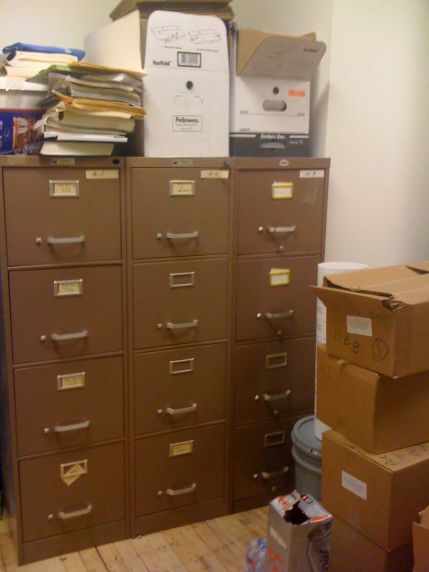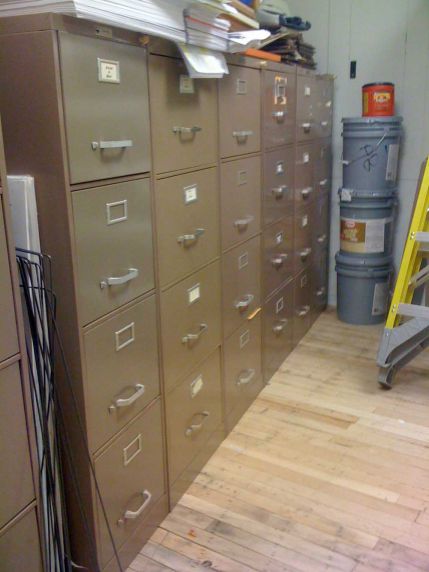Fieldwork with the AFT archivist
Another city, another hotel, and another office with documents ready to be appraised and brought to the archive. Sounds mundane, but within these trips there is the element of surprise. What will the file cabinets and dusty boxes contain? Will those in charge of the files be willing to give full access to everything or just one room? What type of work environment will I be in? Are the files ordered or a jumbled mess? What has already been thrown away? Will there be coffee? You never really know what you will find even after speaking with your contact. This is the life of the field archivist. As archivists, we gather documents that reflect our society so that future generations will learn from our experiences. We have been called the gatekeepers of history, but we are also, at times, the judge and jury of what will be preserved for centuries. When I go into the field and appraise records for the AFT historical collection at the Reuther Library, I am actively seeking documents that will reflect the cultural memory of the American Federation of Teachers and education reform issues.
The American Federation of Teachers has a unique relationship with its archivist here at the Reuther Library. I am on a subsidy position, which the AFT has supported for over 15 years. Initially the job was to care for, process, and make available the AFT collections to the general public. AFT quickly realized that it needed and wanted more from its archivist. One of the needs was to actively seek out new AFT collections, which would involve visits to affiliates to appraise potential collections and to find either local archives that would take the collections or bring them back to the Reuther Library. While at the affiliates I would also train staff about the principles of records management and how to preserve their own history.
Working with AFT, I created a collection policy, establishing three areas to evaluate when talking with an affiliate about a potential visit: first, how long has the affiliate been in existence; second, how unique is the affiliate’s history; and third, does the affiliate have a great need for records management and archival assistance. We further broke down number two to highlight unique factors such as education reform efforts, establishment of a new model for collective bargaining, strikes or other actions, and community involvement. Every year the AFT and I develop a list of affiliates to target based on the criteria above.
For the past several months, I have been contacting a local in the Midwest. The local fit all three criteria: it has been around since the 1930s, has many unique examples of labor-management cooperation and education reform initiatives, and, last but not least, they sought out my help. The assistant to the president called and asked if I could come right away to look at a room with 20 file cabinets, boxes, and other loose materials. After some phone conversations about what the room contained, the contents were still a mystery; there were financial records, arbitration documents, boxes from the old president, and more. I knew that my best bet was to expect everything and nothing.
Upon arrival at the local’s office, I met with my contact and the office manager. I am always aware of the fine line between boring a person to death with archival theory and offering them welcome practical tips whose impact on their day-to-day work will be clear. At first, all they understand is that I am there to help clean out the file room. First, I go over some kinds of documents they can assess on their own. I stress the value of some historical records like meeting minutes and negotiation files. I explain that some records have served their purpose and can be discarded like form letters. I start seeing nods of understanding, and they appreciate my knowledge. Then I explain the grey area where my expertise comes in such as with subject files and grievances. Sometimes you strike gold within those files structures, but mostly they do not have lasting historical value. I explain my approach and always reassure them that I will ask many questions during the week as I go through the files.
These discussions are vital to establish trust. I have laid out what I am going to take, how I am going to take it, and what I am going to leave behind. I have demonstrated my knowledge of archives, records management laws, and, of course, a complete understanding of the culture and history that I am collecting. We are not just impartial observers but participants and, at times, directors of this history. We should be fully aware of the history and culture to make the proper decisions for record keeping. By being a part of AFT’s history and understanding its culture, I can walk into any AFT affiliate and quickly gain their trust.
After a review of the room I realized 80% consisted of old financial records that had been kept as long as was required by federal guidelines. These could be discarded. The remaining records were comprised of subject files, grievances, and meeting minutes. I proceeded to box them up and create an inventory. Seems simple, but the filing structure was a mess that no one could understand, and it took some time to rename the folders and write it all down. In creating sense of the mess, I was doing some preliminary processing in the field.
Therein lies the key to how we are bringing in some new collections. This appraisal and preliminary processing method—triage—shortens the time it takes to open the records for research once they are at the Reuther Library. When the collection arrives at the Reuther, I only need to perform minor touch ups, input the information in our management system, and use the inventory made in the field as the finding aid. We hope this process will only take a few months from the time records enter the door to when they get placed on a shelf and ultimately get requested by a researcher.
Another aspect to fieldwork is the wow factor—the cool finds for the archive or for the organization itself. I found some legal documents about a foundation that I brought to the office manager. I did not need them but wondered if he knew what they were. He did! They had been looking for that document for years. Not only did this bring the organization a sense of accomplishment for bringing in the archivist, but it also illustrated perfectly my reasoning for standard file naming. I also found some photographs from the early 1990s shoved in file cabinets between folders. I asked around, and they all pointed me to one person who not only identified most of the pictures but also gave me the stories about the community programs started by the local in the late 1980s. Now I know more about the collection from a person that was part of making those files. She gave me more information to fill in the finding aid’s scope and content note, making the files more accessible and contextually richer for researchers.
This is the life of the archivist in the field. Walking into a situation unaware of what possibly could happen. So one of the biggest rules I follow is to expect the unexpected. Things will change in a minute; you will get an extra box of materials to look through right when you are walking out the door. Another is you will be given access and expect more access when trust is gained. And that trust is explaining everything in a manner that the people who created the records understand. It’s also important to relay to them from the start that you are there to help. When leaving any AFT affiliate, the staff has a better understanding of how to control their records. They can easily refer to my report for guidance in what to keep, so they have the skills needed preserve important historical records and follow proper records management. And the Reuther Library gets to share these historic records with researchers around the world. It is a win-win for everyone.
Daniel Golodner is the Archivist for the American Federation of Teachers (AFT).
- dgolodner's blog
- Login to post comments
- Printer-friendly version



 Reddit
Reddit Facebook
Facebook LinkedIn
LinkedIn